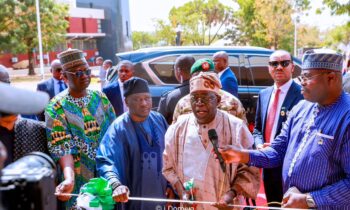Last week Monday selected representatives of the Nigerian Electricity Supply Industry (NESI) led by the chairman of Nigerian Electricity Regulatory Commission (NERC), Sanusi Garba, met in Lagos to put heads together in order to find a solution to the ever wobbling electricity industry.
They took a break from their meeting to address the media on what they had resolved to do to find what some people described as palliatives but not permanent solutions to the series of problems the power industry is presently confronted with.
The issue of power purchase agreement( PPA) which has been at the front burner of all the problems was barely discussed at the media briefing. The issue of gas supply was partially brushed over and not dealt with the way it should have been dealt with, ditto the issue of the effectiveness of the regulatory commission’s supervision over the industry as a whole.
The other burning issue includes the collection and remittance by the electricity distribution companies (Discos) which is the bases of the crisis in the power sector today.
However, after listing to the barrage of questions asked by journalists, Chairman Sanusi Garba assured that after their meeting things would not be the same in the industry again.
He went ahead to say that the power sector is undergoing reform that must be allowed to work if Nigerians want a stable power supply.
The power industry is undergoing power sector reform according to the chairman of NERC. He said as far back as 2005, and in recognization of the challenges facing the power sector, Nigeria embarked on power reform with the intention of bringing the private sector vibrancy into the sector. The government he said has tried to fund the sector but there is a decline in infrastructure.
He made it clear that reform is a journey and not a destination and the power sector is on that journey, therefore we should evaluate how far we have gone on this journey to ascertain if we are heading in the right direction, as far as power is concerned.
The NERC boss reminded Nigerians that the sector has been afflicted by an infrastructure deficit which is being sorted out, stating further that the industry is not there yet as there are challenges in transmission, distribution and there are also challenges in gas supply. “Have we done it quickly enough, probably not?”
The most important thing according to the chairman is that investment is being made in transmission. “The TCN will tell you how much investment that has been deplored into the subsector. For so many years, and in many communities the transformers you find there are overloaded.
There were expectations that after privatization things would happen expeditiously, that is to close the gap already noticed, but there are challenges along the journey itself. It has not been perfect but obviously, everything is looking up along the plans as new generations are being put up, he said.
“ TCN would tell you the number of new transformers that have been purchased recently just as Discos would tell you the amount of investment that they have made.”
He said what is required is to allow the reform to work.
After going down memory lane he promised that NERC would put the necessary machinery in place to ensure the smooth operations of the industry. He assured that prompt attention would be paid to the sectors in the power value chain.
Part of the moves to ensure the industry functions well, he said, is the deployment of phase II of the Mass Metering Program.
According to him, even if the meters are not on the ground yet, all the necessary processes to ensure the program takes off smoothly have been put in place.
The commission however assured that in the next three years, eight million meters would be deployed in order to close the metering gap in the country. It however stated that 100 percent closure cannot be guaranteed as people would continue to build houses and this would lead to continuous demand for meters.
Sanusi Garba further enumerated the various steps taken so far to address the current challenges in the power sector.
Giving a review of the steps taken so far, he stated that a lot of work is being done to ramp up generation.
According to him, what is important to the Nigerian consumers is what the industry is doing to move out of the current challenge and return supply to what it was before, and also to begin to improve on what it was last year.
He said the gas pipeline supplying Okpai has to been restored.
Aside from this, he said, the Okpai phase II power plant in the same premises as Okpai, NERC is currently discussing with the owners to see how gas can be supplied to it and also bring that plant on stream, he said.
He said by the end of Monday last week, the pigging of the pipeline supplying gas to the Calabar Power Plant would have been completed and 450 megawatts restored to the national grid.
Furthermore, he stated that he has been assured that two units from Afam six Power Plant would be back on stream in the next three weeks.
NERC, he said has approved a special gas pricing for emergency contracting of gas from the Nigerian Gas Marketing Company Ltd for the Niger Delta Power Holding Company (NPDHC) to optimise utilization of its power plants. This is expected to bring about 800MW would be generated from the NDPHC plants.
The NERC boss also said the gas pipeline affected by acts of vandalism had been restored
He regretted that the national power grid collapsed twice last week amid fuel scarcity, a hike in fuel price.
Garba said the meeting was in line with the directive of Abubakar Aliyu, minister of power directive that stakeholders should work together to restore the normal distribution of electricity and to improve supply nationwide.
He reiterated the shortage of gas supply to power plants, the collapse of the national grid, illiquidity of the industry, huge metering gap and infrastructure deficit as some of the challenges bedevilling the sector.
He said the government planned to ensure that the thermal power plants are working optimally and that the grid was stable.
The NERC boss said the gas pipeline affected by acts of vandalism had been restored.
He added that the “pigging” of the gas pipeline supplying gas to the Odukpani Power Plant was scheduled for completion on March 21 yesterday to ramp up generation by about 400MW.
On tariff adjustments, Garba said the review was in line with the tariff methodology adopted by NERC for periodic adjustments of tariffs based on inflation, exchange rates and gas pricing.
Also speaking the managing director of Niger Delta Power Holding Company NDPHC, Chiedu Ugbo, said that at least 800mw is expected to come on stream with the intervention made so far.
He said in calabar, the gas supplier is currently maintaining the gas pipeline, pigging, and the exercise was supposed to have ended yesterday, Monday, and by 12 midnight Calabar Power plant should have been restored to 450 megawatts.
According to him, it is the outage in Calabar and Alaoji as well that added to the overall outage in the country. So between Calabar and Alaoji about 800mw was lost. In Aaloji 337mw has been lost because the gas supplier, Total Energies suffers force majeure.
“We have five powers plants in the western axis of Niger River up to Olorunsogo is Ogun state, but our challenge has been gas. Thankfully with the intervention of the federal government and NERC we are now able to contract for 600mw worth these power stations for long period. We have negotiated all the issues, the agreements, with the Nigerian Gas Marketing Company, we have obtained the approval of the NERC as to the gas price, then we go-ahead to close the issues and begin to get gas from the gas company,” he said.
On system collapse, he said: “Nigeria is a peculiar country as far as power is concerned. In how many countries do people go and blow pipelines and in how many countries do people go and pull down transmission towers,” he asked
On his part, Sule Abdulaziz, managing director, TCN, said the current administration had spent over N1 trillion on strengthening the transmission network.
Abdulaziz said the TCN had the capacity to wheel 8,000MW but was currently receiving 3,500MW from the GenCos.
He apologised for the recent collapse of the national grid
At the discos level, the distribution companies are the last mile of the value chain. They made a projection recently that more power would be added to the grid. In every design, the distribution capacity should be higher than generation and transmission capacities so that it can accommodate any increase in power. They also agreed that there is a need to maintain the existing capacities that the Discos have through investment and regular maintenance.
Currently, NERC is looking at the performance of each and every distribution company and at the same time trying to see how they expand to accommodate more power. So the issue of power rejection is no longer there since NERC has said once power is allocated to the Discos they cannot reject it.
Also, recently, NERC approved for the distribution companies over N100billion investment in the next five years. The discos at the various level of this investment.
The managing director of Ikeja Electric, Folake Soetan, in her contribution at the meeting spoke on what her company is doing as regards closing the metering gap, she said the regulators has been very supportive regarding the initiative of closing the metering gap which is critical to customers, and a such they started the national metering phase zero last year. The distribution companies installed about 900,000 meters last year with Ikeja doing over 111,000, she said.
The focus of the Discos, she said are two major things, one is to continue phase I of the metering program very quickly. The procurement process has started.





